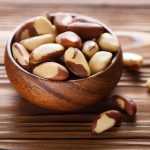Selenium deficiency linked to increased risk of premature death
 (NaturalHealth365) A recent study published in the International Journal of Molecular Sciences highlighted the importance of maintaining a balanced selenium diet for overall well-being. Researchers emphasized the serious repercussions of selenium deficiency, especially concerning diseases like cancer and viral infections. They also pointed out how selenium’s antioxidant properties boost the immune system and help prevent cardiovascular issues while reducing inflammation.
(NaturalHealth365) A recent study published in the International Journal of Molecular Sciences highlighted the importance of maintaining a balanced selenium diet for overall well-being. Researchers emphasized the serious repercussions of selenium deficiency, especially concerning diseases like cancer and viral infections. They also pointed out how selenium’s antioxidant properties boost the immune system and help prevent cardiovascular issues while reducing inflammation.
Research has also shown that selenium, working alongside vitamin E, is a powerful antioxidant that fights harmful free radicals. These findings have led researchers to recognize selenium’s significant role in combating various cancers and conditions influenced by oxidative stress and inflammation.
Study links selenium deficiency to increased risk of cardiovascular death
The European Journal of Clinical Nutrition revealed that diminished serum selenium levels were correlated with increased mortality risk in an older population over a 6.8-year time frame. Researchers studied 449 older men and women who participated in an epidemiology project in southeast Sweden. Each participant’s serum selenium levels were measured for a baseline at the study’s enrollment. Levels were measured again in 48 months in 98 of the subjects.
Over the next seven years, there were 122 deaths, including 85 attributable to some form of cardiovascular disease. When researchers looked at only those subjects whose selenium levels placed them in the lowest quartiles for serum selenium levels, they observed an adjusted 43 percent increase in the risk of death from any cause and a 56 percent increased risk of cardiovascular-related death when compared to the rest of the study’s subjects with higher serum selenium levels.
Western medicine’s lack of awareness regarding selenium deficiency
If you have not considered selenium supplementation in the past, you aren’t alone. Most physicians assume their patients are getting enough selenium from the plant-based foods consumed, so the need for a selenium supplement does not routinely come up.
But in many places across the United States, as well as several other regions around the world, such as China and Russia, there is evidence that it is no longer safe to assume you will be able to get adequate selenium from the plants you fit into your diet.
Boost your selenium intake for optimum health
The adult Recommended Daily Allowance (RDA) for selenium is 55 micrograms daily. Pregnant or lactating women need a slightly higher level, at 60 and 70 micrograms per day, respectively.
Editor’s note: Keep in mind that most RDA numbers are outdated and way too low for optimal health. The numbers are given to you as a “starting point,” but we suggest talking to a trusted holistic healthcare provider or health coach with enough nutritional supplement experience to help you avoid a selenium deficiency.
Selenium supplements are available, or you may alter your diet to ensure adequate selenium levels through the foods you eat. One of the simplest ways to add selenium to your daily intake is to increase your consumption of foods containing high levels of selenium. For example, Brazil nuts have a whopping 543 mg of selenium in a one-ounce serving.
Certain seafood, such as halibut, oysters, and tuna, contain relatively high amounts of selenium compared to other foods. Other foods containing relatively high levels of selenium include sunflower seeds, eggs, and whole-grain bread. Just be sure to always eat organically, to avoid unwanted chemicals.
Sources for this article include:
NIH.gov
NIH.gov
Lifeextension.com
Lifeextension.com
Medicalnewstoday.com



